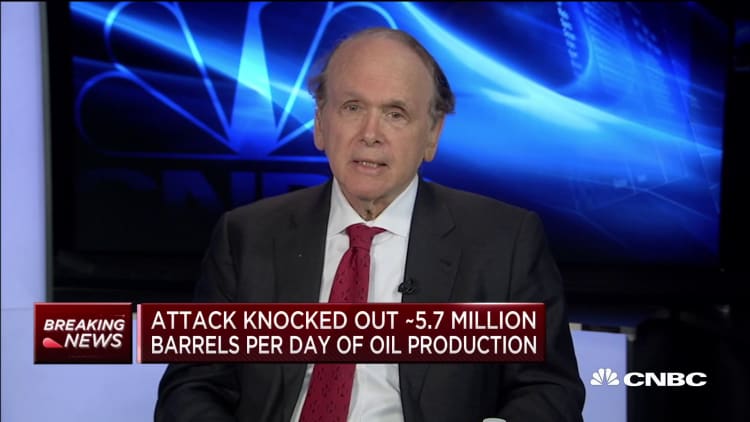
Energy prices surged Monday following some stunning developments in the Middle East, but it likely will take quite a bit more before having a broader effect on the economy.
West Texas Intermediate crude briefly rose more than 11% to above $60 a barrel following the drone attack on Saudi-held oil interests, but the jump was kept in check through the session amid expectations that in a worst-case scenario, the U.S. would simply open up its strategic reserve to hold back prices.
Even if the shock waves continue to reverberate from the conflict — international benchmark Brent crude rose even higher Monday — the long-ranging implications are not expected to be pronounced.
The "level to watch" is around $80 a barrel, said Nick Colas, co-founder of DataTrek Research. The current spike, he said, is likely "unsustainable."
"As dramatic as the weekend's events may be, it's not like Iran or its surrogates actually took over Saudi oil fields, as was the case in 1990 with Iraq/Kuwait," Colas said in a his daily note to clients. "Saudi Arabia has every incentive to get production back online, secure its facilities better, and return to full production. And, of course, the US has its Strategic Petroleum Reserve to tap as well."
Even the $80 level might not mean a pronounced broader downturn for the economy.
Colas points out that of the recessions the U.S. has seen dating back to the early 1980s, none has come without an oil spike of at least 90%. The Great Recession, for instance, saw a 96% move, while the dot-com bust featured a 141% surge and 1990's was preceded by a 96% jump.
There are a few other notable trends in the history of oil price spikes.
For one, most are driven more by macro effects rather than industry-specific events. The 2008-09 move came due to the financial crisis turmoil, while at least a half-dozen other sharp jumps came as bear market rallies rather than secular-driven long-term increases.
That inherently makes their impact more effect than cause and thus less impactful to the broader economy.
"The attack on Saudi oil is unlikely to be a disaster for the global economy," Jennifer McKeown, head of the global economics service at Capital Economics, said in a note. "Saudi production might resume quite quickly and even if it doesn't, the implications for oil prices and developed economy inflation should be limited."
McKeown sees three possible scenarios: the most likely case, in which Saudi production gets back online quickly and prices drift back to Capital's 2019 forecast of $60 a barrel; a second that entails "an extended outage" and possible further attacks that would take the price up to $85 a barrel; and third that would see a "full-blown U.S.-Iran conflict" that would push prices to $150 per barrel this year before falling rapidly.
In any event, McKeown doesn't see a strong likelihood of long-ranging impacts.
"The moderate and temporary inflationary impact implies that the direct effects on advanced economy GDP growth would be small," she said. "This is particularly the case given that central banks are highly unlikely to respond to higher headline inflation by tightening monetary policy in the current environment."
Indeed, the Federal Reserve meets this week and is still expected to cut its benchmark borrowing rate by a quarter point. However, the chances of the U.S. central bank holding the line rose sharply Monday as oil prices spiked, with traders now assigning the equivalent of a 34% chance of no move.
Still, McKeown cautioned that the Middle East tensions are "another headwind" for a weakened global economy, so "a full-blown conflict could trigger another leg in the global downturn."

Economists from other big Wall Street firms also don't see a pronounced impact.
Beth Ann Bovino, U.S. chief economist at S&P Global Ratings, said the rise in energy prices will cause some damage to consumers, but "the U.S. economy is less vulnerable to oil-price increases than it used to be because household spending on energy as a percentage of GDP has declined as we've become far more energy efficient overall."
Markets seesawed following the day's developments, with the Dow industrials off about 150 points in early afternoon trading. However, energy stocks make up just 4.5% of the S&P 500 market cap, so the impact on the index was even less. The large-cap barometer was off just 0.35% in afternoon trading.
The oil situation "presents yet another headwind for a global economy" though "we don't believe that this short-term disruption to oil production will trigger a global recession," said Mark Haefele, global chief investment officer at UBS.


